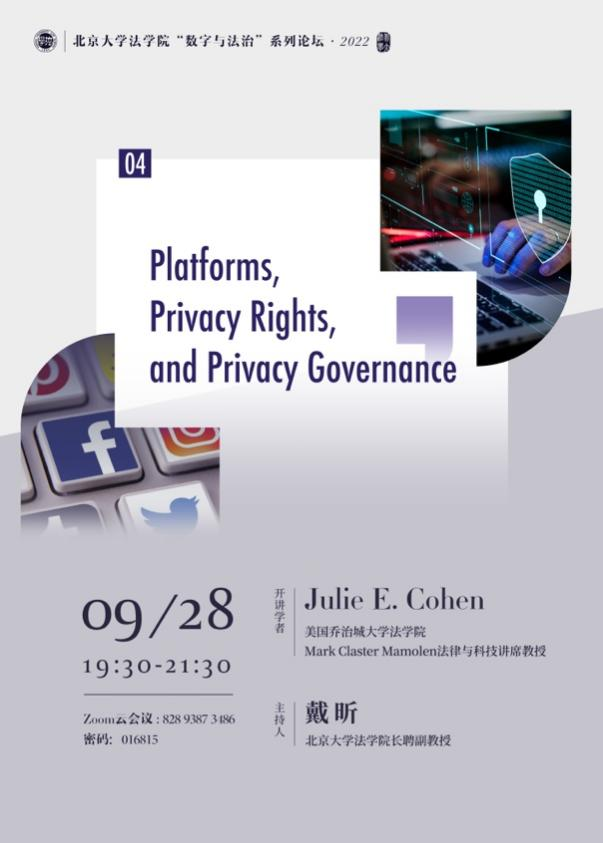Julie E. Cohen: Platform, Privacy Rights, and Privacy Governance
Date:2023-03-06
The rapid development of digital technology poses new challenges to the construction of the rule of law in the digital age. PKULS held a series of forums on "Digital and the Rule of Law" in September 2022. The theme of this forum was "Privacy and Data Protection Law from a Global Perspective". Well-known scholars from Japan, Europe, the United States and China were invited to explore this core theme together.
On September 28, 2022, the fourth lecture of the "Digital and Rule of Law" series of forums was given by Julie E. Cohen, Mark Claster Mamolen Chair Professor of Law and Technology at Georgetown University Law School. A wonderful two-hour online academic lecture was held on the theme of “Platform, Privacy Rights, and Privacy Governance”. The lecture was presided over by Dai Xin, a tenured A.P. of PKULS. More than 200 teachers and students participated in the lecture, and the activity received enthusiastic response.

This article presents the key points of the lecture in the form of written transcripts.
Julie E. Cohen:
1. The Concept of Platform
A platform is an information intermediary that facilitates digital network interactions and transactions between users with the help of data-driven algorithms and standardized modular interconnection protocols.
From the perspective of political economy, information technology makes human society move from industrial capitalism to information capitalism. Intangible resources such as data, patents, and copyrights play an increasingly important role in economic production. Labor, land, currency, and manpower are gradually being digitized, and the mode of goods transaction and exchange has changed from relying on the market to relying on the platform.
The emergence of platforms has changed the production model, but it is not a neutral intermediary agency, but also a participant in economic activities that captures the surplus value. Based on infrastructure such as technical protocols and technical modularization, platforms provide society with many services, changing our traditional understanding of the concept of "market". However, the purpose of the platform is not to share benefits with the world, but to make profits by increasing user stickiness and binding users.
2. The Pathology of Platform Privacy Issues
The privacy problems caused by the platform are mainly economic and political.
From an economic perspective, personal data has become the new public domain. The platforms collect personal data through sensors, interacting with users, etc., but then refuse to disclose its algorithms and data. Platforms use the personal data they have acquired for profit, but individuals struggle to claim rights over the data that is used.
Politically speaking, the platforms are information laboratories. The data-based production model requires the large-scale participation of users, and the platform therefore adopts methods such as quickly distributing preference information to increase user stickiness. This approach reconstructs the network environment in which users participate, accelerates the process of polarization effects, and impacts people's consensus on social facts and political reality.
3. Privacy Rights and Privacy Governance
Based on the traditional legal framework, three different common paradigms have been developed for privacy governance, but all three paradigms have proven to be ineffective.
Under Paradigm 1, users claim to the platform that their privacy rights have been violated and seek remedies for private rights.
Under Paradigm 2, the law requires platforms or the government to review the content of specific information generated by platforms based on processing personal information.
Under Paradigm 3, the government conducts regulatory activities related to personal information protection based on the common regulatory means of the administrative state in the 20th century.
4. Approach Design of Privacy Governance
Governance paradigms based on rights or content moderation are ineffective because neither protect individual liberty nor change the motivations of platforms. Privacy governance and content governance are inseparable. The governance of big data marketing also needs to build public supervision capabilities for data collection and algorithm design. An effective solution should pay attention to the scale of the platform, interface design, and network data flow, and should prevent the seamlessness, accuracy, personalization and viral spread of platform content, and at the same time, the platform operators must be held accountable.
Administrative controls with a 20th-century approach cannot effectively govern platform behavior. The administrative governance model for the platform should be built around mass-market standardized interfaces and orders of magnitude network flows. New governance tools should be designed in the face of problems, or may be solved by means of public audits.
Afterwards, Julie E. Cohen had an in-depth interaction with the participating students and answered the students' questions.
Translated by: Yan Xiaoshuang
Edited by: Zhou Yaxuan



